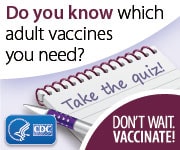What to know
- It is important for people with diabetes to get annual flu vaccinations to prevent flu and serious flu complications.
- People with diabetes should avoid the nasal spray flu vaccine, opting for injectable vaccines.
- If you have diabetes and experience flu symptoms, call your health care provider right away.
- CDC recommends prompt flu antiviral treatment for people with diabetes who have flu infection or suspected flu infection.

Background
Diabetes is a chronic disease that affects how your body turns food into energy. There are three main types of diabetes: type 1, type 2, and gestational diabetes (diabetes while pregnant). More than 122 million Americans are living with diabetes (37.3 million) or prediabetes (96 million). People with diabetes (type 1, type 2, or gestational), even when well-managed, are at higher risk of developing serious flu complications. These complications can result in hospitalization and sometimes even death. Flu-related complications include pneumonia, bronchitis, sinus infections, and ear infections. About 30% of adults hospitalized with flu reported to the CDC had diabetes in recent seasons. Acute illnesses like the flu can make controlling blood sugar levels harder. The flu may raise blood sugar levels. For example, a reduced appetite when sick can cause blood sugar levels to fall. People with diabetes need to follow the sick day guidelines if they become ill.
Vaccination is the best protection against flu
Flu vaccination is especially important for people with diabetes because they are at higher risk of developing serious flu complications. Flu vaccination also has been associated with reduced hospitalizations among people with diabetes (79%).
Flu Vaccines for People with Diabetes
- Injectable influenza vaccines (flu shots) are recommended for use in people with diabetes and certain other health conditions. Flu shots have a long, established safety record and studies support the safety of flu vaccines in people with diabetes.
- People with diabetes should generally not receive the nasal spray flu vaccine (i.e., the live attenuated influenza vaccine or LAIV). Your doctor or other health care professional can answer any questions you might have about flu vaccine.
Pneumococcal vaccination is also important
- Having flu increases your risk of getting pneumococcal disease.
- Pneumococcal pneumonia is an example of a serious flu-related complication that can cause death.
- People with diabetes should be up to date with pneumococcal vaccination. This vaccination helps protect against pneumococcal pneumonia and other serious infections.
- You can get the pneumococcal vaccine your provider recommends when you get a flu vaccine.
- Pneumococcal vaccination should be part of a diabetes management plan. Talk to your healthcare provider to find out which pneumococcal vaccines are recommended for you.
Other Preventive Actions for People with Diabetes
In addition to getting a flu vaccine, people with diabetes should follow the CDC's everyday preventive actions. These include avoiding people who are sick, covering coughs, and washing hands often. They can also take steps for cleaner air and hygiene practices like cleaning frequently touched surfaces.
Specific Health Actions for People with Diabetes
- Plan to maintain sufficient supplies of your regular medications for chronic conditions.
- Ensure you have a least a two-week supply of necessary medications on hand.
If you experience flu symptoms, call your healthcare provider right away. Antiviral drugs can treat flu illness and may prevent serious flu complications. CDC recommends prompt flu treatment for people who have flu infection or suspected flu infection.
Resources
Adult Vaccine Quiz

Take this short quiz to discover needed vaccines and create a customized printout for your next medical appointment.
